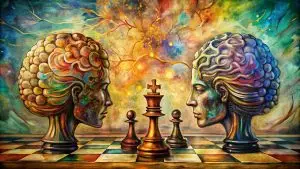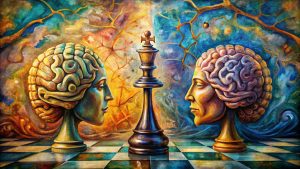Chess Mindfulness: How Playing Chess Can Improve Your Mental Well-Being
In today’s fast-paced and demanding world, discovering moments of tranquility and mental clarity is more crucial than ever. The constant barrage of information, endless to-do lists, and the pressure to perform can lead to mental fatigue and stress. Traditional mindfulness practices like meditation and yoga have long been recognized for their ability to promote mental calm and focus. However, a new contender is emerging in the realm of mindfulness practices: chess. This time-honored game, with its intricate strategy and intellectual stimulation, is increasingly being recognized as a powerful and innovative method for achieving mental clarity and calm.
Chess mindfulness is a concept that combines the strategic depth of chess with the principles of mindfulness. Mindfulness is the practice of being fully present and engaged in the current moment, acknowledging your thoughts and emotions without judgment. This practice cultivates a state of mental clarity and calm, essential for overall well-being. Chess, a game that requires strategic thinking and intense concentration, aligns remarkably well with these principles. The intersection of chess and mindfulness creates a unique approach to enhancing mental well-being.
One of the key aspects of chess mindfulness is the deep focus and concentration required during a game. Chess players must analyze each move and anticipate their opponent’s strategy, mirroring the mindfulness practice of concentrating on one’s breath or a particular object. This level of focus helps players stay present and engaged, reducing mental clutter and enhancing cognitive function.
Moreover, chess can be a significant stress reducer. During a game, players often experience a state of flow—a mental state where they are fully immersed and lose track of time. This flow state can significantly reduce stress and anxiety, providing a mental escape from everyday pressures and fostering a sense of calm and relaxation. Engaging in chess mindfulness can therefore be a powerful tool for stress relief.
Practicing chess mindfulness can enhance concentration and focus, reduce stress and anxiety, improve cognitive abilities, and build emotional resilience. Chess requires undivided attention, helping players develop the ability to concentrate intensely on a single task and increase their attention span. The immersive nature of chess allows players to enter a state of flow, providing a mental escape and a sense of calm. By promoting critical thinking and problem-solving skills, chess boosts cognitive function and memory. Managing the emotional ups and downs of the game fosters patience, perseverance, and emotional balance.
Integrating chess mindfulness into your daily routine can be a fulfilling way to enhance mental clarity and well-being. Establishing a regular practice schedule, making chess a social activity, using technology to your advantage, and combining chess with other mindfulness practices can help you seamlessly incorporate this practice into your life. Reflecting on your performance and setting achievable goals can keep you motivated and committed to your chess mindfulness practice.
- What is chess mindfulness?Chess mindfulness is the practice of playing chess with a focus on being fully present and engaged in the game. This approach combines the strategic depth of chess with the principles of mindfulness to enhance mental clarity, reduce stress, and improve overall well-being.
- How can I integrate chess mindfulness into my daily routine?To integrate chess mindfulness into your daily routine, establish a regular practice schedule, find a quiet and comfortable environment, focus on the process rather than the outcome, and reflect on your performance after each game. Combining chess with other mindfulness practices like meditation can further enhance its benefits.
- Can playing chess socially enhance mindfulness?Playing chess socially can enhance mindfulness by fostering social interaction and building connections. Engaging with different players provides opportunities to learn new strategies and perspectives, enriching the overall experience and promoting emotional well-being.
- Are there online resources for practicing chess mindfulness?
The Interface of the two; chess and mindfulness
Mindfulness refers to the state of being attuned and fully present in the exact moment, with respect to one’s thoughts and emotions, without judgment. It facilitates the functioning of creating mental clarity and a state of calm which is healthy and essential. Chess is a game calling for strategy and concentration, technically similar to the fundamentals of mindfulness. The two interface at the following positions:
-
Deep focus and concentration
Playing chess is like a concentration exercise. One has to think much ahead of each play and keep trying to predict the opponent’s play. All of this concentration is tantamount to practicing mindfulness, where the focus is on the breath or an object. Improvement will be noticed in ways of keeping present and attentive by the player.
-
Reduction in Stress
A chess game may bestow on a player mental immersion, losing track of time. The flow state is likely to reduce stress and anxiety to a considerable amount and act as mental relief from the everyday hustle and bustle and ensure a feeling of restfulness and at ease.
-
Cognitive and Emotional Gains
Chess works the brain, improving its functions, including cognitive processes on memory, problem-solving, and critical thinking. It also teaches patience and endurance, as players must learn to endure both victory and defeat. It is these cognitive and emotional benefits that help to promote overall mental well-being, making chess a very holistic mindfulness exercise.
-
Enhanced emotional resilience
Chess helps in controlling one’s emotions, particularly when unexpected moves occur or if a player is suddenly at a disadvantage. Here is where emotional resilience is developed, the same way that mindfulness practice requires individuals to engage their emotions. This allows players to cultivate self-control, which would improve emotional regulation in other aspects of life.

Benefits of Chess as a Mindfulness Practice
Enhanced Concentration and Focus on
- Deep Engagement: Since a chess game wants all attention to be given and the player needs to sync with one single task, it also helps players get the ability to concentrate hard on one task.
- Increased Attention Span: Regularly playing chess can come with a long attention span. You can be able to concentrate on more complicated tasks for a longer time.
- Reduction of Stress and Anxiety
- Mental Escape: Playing a chess game will foster a mental charge of escaping stressful activities of the day, which would truly mean how immersed the player could feel.
State of Flow Through how it seriously takes an individual, chess helps a person reach a state of flow, wherein they lose sense of time and calm down. Improvement in Cognitive
- Abilities Critical Thinking: This hobby boosts the critical mind and lets it breed, as a player needs to think and analyze as many possibilities as possible and anticipate their opponents’ moves. Problem Solving Helps solve problems efficiently; chess involves both brainstorming in order to outsmart the opponent and developing ways to do that.
- Boosts Memory: constant playing of chess can remarkably improve memory and cognitive functions. It boosts the user’s ability to remember complex patterns and strategies.
Emotional Regulation and Resilience
- Patience: Chess is an excellent teacher of patience. A player is supposed to wait patiently for his turn and arrange how to make the move.
- Perseverance: the game enhances perseverance, for the fact that it encourages a player to accept losing bites and, in the long run, handle his mistakes.
- Emotional Balance: The emotional swings associated with winning and losing in chess help players build emotional resilience and regulation.
Social Interaction and Bonding
- Forming Relationships: Doing an activity like playing chess with other people brings in the factor of social interaction and bonding, which contributes to good emotional health.
- Learning from Others: Engaging with different players gives a chance to learn new strategies and perspectives to make the game more fun and engaging.

How to be Mindful Through Chess
The Right Environment
- Quiet Space: Find a quiet, space and comfortable area, free from distraction.
- Quiet environment: Ensured sitting in a comfortable space with proper lighting, and around in minimum distraction area.
Not Focusing on the Result
- Present: Focusing on every move and its process without having a tension about winning and losing the game.
- Enjoying: Learning and the strategic steps for any game of interest
Not Playing on Auto-Pilot
- Mindful Movements: Be cognizant of the tactile experience of moving the pieces and the visual patterns on the board.
- Take your time: Slow down with each move, being fully engaged in the process of decision making.
Reflection at the End of the Game
- Reflection: Take a few minutes to consider how you feel now that the game is over. Was there a high degree of focus, or can you recount any loss of attention?
- Analyze and Learn: Think about the moves you made and how you could have done better. Try and develop a learning mind where you are always improving.
Chess in your System
- Practicing: Make an arrangement to practice chess every day and, starting with a few minutes, increase the time daily.
- Variety: Different opponents; some of them would be real human beings while on others, you could try your luck with the computer. That would definitely keep the game fresh and exciting.
Cross Train with Rest of the Mindfulness Techniques
- Complementary Techniques: Combine and practice chess with other techniques of mindfulness like meditation or deep breathing exercises, which will aid in overall mental clarity and calm.
- Physical Activity: A few light physical exercises or stretches before and after playing chess will help keep you relaxed physically and sharpen your mind.
Including chess as part of your daily life is a fun and effective way to improve mindfulness, develop higher-level thinking skills, and reduce stress. A few practical ways to include chess in your day include:
Playing Regularly
- Set Specific Times: Chose specific times of the day dedicated to playing. This could be in the morning, say to start your day with a clear mind or in the evening to wind down.
- Consistency is Key: Try playing at the same time every day. Over time, it will become a habit. Even 10-15 minutes daily can lead to a huge difference.
Make it Social
- Play with Friends and Family: Seek a friend or family to play regular games of Chess. This will introduce a social aspect to you, thus making it enjoyable.
- Subscribe to a Chess Club: One can subscribe to a local or online chess club where the person has regular scope of playing and learning from others.
Tap into Technology for Your Advantage
- Online Tools: A player can leverage the technologies like Chess.com or Lichess to track his performance, analyze his games, discuss his doubts with fellow players, and he can even play in the assigned time tournaments online initiated by these apps.
- Chess Apps: Download chess apps into the smartphone or tablet in order to practice even “on the go,” during commutes, or even on a break when possible. That will make a useful way of utilizing idle time.
Combining Chess with Other Activities
- Mindfulness and Meditation: It is possible to combine your activity of chess practicing with sessions of mindfulness or meditation, such as in meditating for a few minutes before a game in order to improve focus.
- Physical Exercise: Do a bit of minor physical activity, either stretching or yoga, before the chess program starts and afterward, to make the body alert and freshen up your mind.
Reflect and Learn
- Post-Game Reflection: Use a few minutes at the end of every game to reflect on how you played. What went well? What could you have done better? This self-reflection helps you develop yourself as a player and authenticates your mindfulness practice.
- Keep a Chess Journal: Have a journal in which you write about your games, thoughts, and the progress you make. Writing about your experience deepens your understanding of the game.
Stay Motivated
- Set Goals: Make sure to define clear, attainable goals for your chess practice, such as a new opening you want to learn or improvement in your rating. This will help keep you motivated and focused on these steps you want to take.
- Track Progress: Notice and celebrate small advancements. This would motivate and keep you in the game.

Conclusion
Chess comes out to be a unique and very good mindfulness tool. Acting within the boundaries of the here and now, cutting through mental clutter and increasing cognitive and emotional well-being, chess incorporates itself as a favorable tool to achieve mental clarity and calm. Whether you are an experienced player or are just taking up the game, the way of playing chess as a mindfulness practice is life-changing. Step into the challenge, savor every play, and relish deep peace and clarity of the kind that only chess can bring.



0 Comments